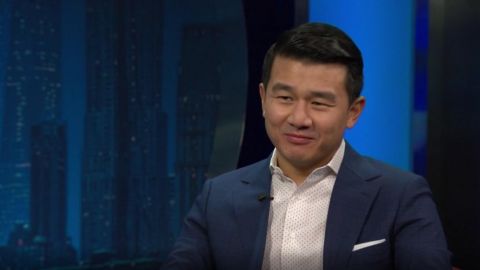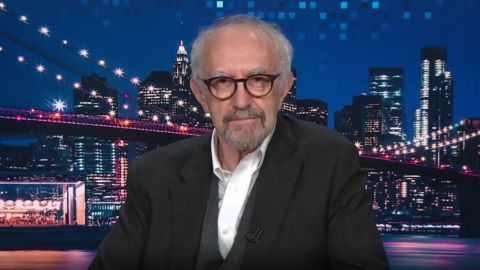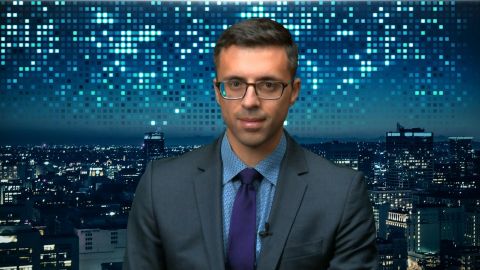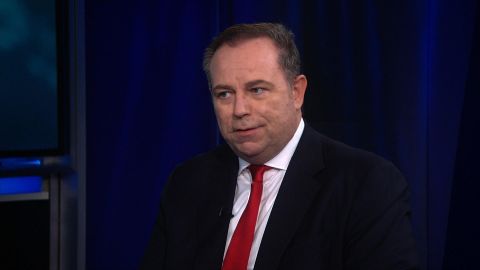Read Transcript EXPAND
CHRISTIANE AMANPOUR: So let’s now seamlessly sail into some comedy with stand-up comedian and “Daily Show” correspondent Ronny Chieng. He had his breakthrough last year as Eddie Cheng in “Crazy Rich Asians,” a fictional portrait of the glitz and drama of the Singapore elite. Today, he’s making his debut on Netflix with “Asian Comedian Destroys America,” where he explores the United States from his unique vantage point as a Chinese immigrant. And our Hari Sreenivasan gets a preview.
(BEGIN VIDEOTAPE)
HARI SREENIVASAN: You’re ethnic Chinese born in Malaysia, grew up in Singapore and New Hampshire. You started your comedy career in Australia. You studied to be a lawyer. This all sounds like a LinkedIn profile of like a super secret agent’s file.
(LAUGHTER)
RONNY CHIENG, COMEDIAN: Yes. Yes. You’re doing a really good job of, yes, just listing down the…
SREENIVASAN: Right? Yes. I mean, how did that, from law school, turn into comedy?
CHIENG: Global financial crisis in 2010 meant a lack of high-paying corporate jobs. I couldn’t even get a job. I couldn’t get a job. And then I started doing stand-up comedy, and that worked out a lot better, as in terms of, even in the moment, I was getting more work from stand-up comedy than I was from law, so…
SREENIVASAN: Yes. How’d that go over with Asian parents, the conversation, I’m not practicing law, mom? I’m…
CHIENG: Yes, I didn’t tell them.
SREENIVASAN: Really?
CHIENG: Yes, I didn’t tell them. I just did it, because we were in separate countries. I was in Australia at the time, and they were living in Singapore.
SREENIVASAN: So, they think you’re billing like $500 an hour equivalent, and yet you’re really at 1:00 a.m. trying to make four people that are really drunk laugh.
CHIENG: For like — not only am I not making money. I actually lost money doing that, yes, just trying to go out there. So they don’t know. Even to now, they still don’t know.
SREENIVASAN: It’s really — it’s just a secret?
CHIENG: Yes, it’s a secret. They don’t know. I’m hoping they don’t watch this special on Netflix.
(LAUGHTER)
SREENIVASAN: Now, most Americans are probably going to be familiar with you from “The Daily Show With Trevor Noah.”
CHIENG: Sure.
SREENIVASAN: And I think, if they have seen that, the thing that might have put you on the map for them is your sort of response to a story, a pretty horrible story, where someone goes down to Chinatown basically to make fun of Chinese people.
(BEGIN VIDEO CLIP, “THE DAILY SHOW”)
CHIENG: (EXPLETIVE DELETED) this guy. And, seriously, Mr. Miyagi? Update your reference material. That’s like me making fun of Americans for “Saturday Night Fever” and Mr. T. Yes, real topical stuff, buddy. If you want to come at Chinese people, make fun of China’s high pollution, or the fact that they censor most of the Internet, which in this case might actually be a good thing, since no person in China will ever have to watch your garbage attempt at comedy.
(END VIDEO CLIP)
SREENIVASAN: You came here in, what, 2016?
CHIENG: 2015.
SREENIVASAN: 2015?
CHIENG: September 2015.
SREENIVASAN: Were you surprised that in 2015, 2016, that something like that was actually happening in the United States?
CHIENG: Yes, I was. And guess what? Everyone else was surprised as well. That’s why the clip I did kind of went so viral, because everyone was like, oh, this is unacceptable. You know what I mean?
SREENIVASAN: Yes.
CHIENG: So, yes, it is — we can point to the fact that they did that as, like, proof something bad happening, but I also see the popularity of the response as a sign that way more people thought that was unacceptable than acceptable.
SREENIVASAN: Yes, yes. We have — you talk about in your special that we have access now to more information than we ever had before. The Internet is in our pockets. But — and you talk about this in your stand-up, that that’s not necessarily making us smarter. We have a clip here.
(BEGIN VIDEO CLIP, “ASIAN COMEDIAN DESTROYS AMERICA”)
CHIENG: What’s going on in America in 2019? Measles is coming back, right? Bringing back measles. Why not? Why not at this point? How much worse can it get? Let’s bring back measles.
(LAUGHTER)
CHIENG: Every year, America becomes more and more hipster.
(LAUGHTER)
CHIENG: Start to bring back organic small batch diseases.
(LAUGHTER)
CHIENG: Got all these stupid anti-vaccination idiots really some bull (EXPLETIVE DELETED) on the Internet, getting brainwashed, not vaccinating their children. Yo, the Internet is making people so (EXPLETIVE DELETED) stupid.
(LAUGHTER)
CHIENG: Like, who knew all of human knowledge could make people dumber?
(LAUGHTER)
CHIENG: Like, in 50 years, we’re going to look at the Internet the same way we look at smoking right now.
(LAUGHTER)
CHIENG: It’s going to be like, man, I can’t believe 50 years ago we just let pregnant people use the Internet.
(LAUGHTER)
CHIENG: What were we thinking? Pregnant people were just using the Internet. We would use the Internet in front of babies.
(LAUGHTER)
CHIENG: We let babies use the Internet. Yes, in 50 years, we’re going to have special areas outside buildings where you can use the Internet.
(LAUGHTER)
CHIENG: Internet designated zones 50 feet from every entrance. Don’t bring the Internet indoors. Secondhand stupidity is the real killer.
(LAUGHTER)
(END VIDEO CLIP)
SREENIVASAN: A big chunk of this special that you have and a lot of the work that you do is kind of observations by someone with a fresh set of eyes, whether you were doing the stand-up in Australia coming from another part of Asia or here in the United States. You like to say it’s just information, no judgment, just solutions-driven stuff.
CHIENG: Sure.
SREENIVASAN: One of the things you think should happen is that there should be more Asians in the U.S. and that, if you get a chance to vote for an Asian, do it. Why?
CHIENG: I love how you’re analyzing this, like I gave a speech at the U.N.
(LAUGHTER)
CHIENG: No, this was like a comedy show. Like, so you said that you would like more Asian people in the — yes, it was in a comedy show, man.
(CROSSTALK)
SREENIVASAN: Right. That’s right. That’s right. So you’re familiar — you’re totally supportive of Andrew Yang.
CHIENG: Sure, yes.
SREENIVASAN: Since he’s the only Asian that is running right now. Right?
CHIENG: Yes, I guess so.
SREENIVASAN: So, this is an endorsement. You’re endorsing him right now.
CHIENG: Sure. Again, money — will this make me money?
SREENIVASAN: Yes.
CHIENG: I will take whatever position makes me money.
SREENIVASAN: I think if Andrew Yang gets elected, he’d like to give everybody $1,000. So, you’re in.
CHIENG: OK, well, then — I’m in.
SREENIVASAN: OK. That was easy.
(LAUGHTER)
SREENIVASAN: Another place people might recognize you is “Crazy Rich Asians.”
(BEGIN VIDEO CLIP, “CRAZY RICH ASIANS”)
UNIDENTIFIED ACTOR: You know, if you move, it would look more natural.
CHIENG: No, this way, you get our optimal angles.
UNIDENTIFIED ACTOR: Then we’re done.
UNIDENTIFIED ACTOR: Russell, thank you so much. It is an honor to be photographed by you.
UNIDENTIFIED ACTOR: My pleasure. People will love it in the next “Hong Kong Vogue.”
UNIDENTIFIED ACTRESS: Thank you, Russell.
CHIENG: “Hong Kong Vogue”? I knew it. Your dress is a disaster. If you wore the Bottega gown, like I told you to, we would be in the American “Vogue.”
UNIDENTIFIED ACTRESS: You can wear that gown to hell, Eddie.
(END VIDEO CLIP)
SREENIVASAN: It seems like it was a part written for you. You’re a guy that grew up in these places. You might not have been that sort of income strata in Singapore or wherever you were growing up. But did these kind of people?
CHIENG: Yes. Actually, I got to correct you. I actually wasn’t in that movie.
SREENIVASAN: Oh, you weren’t in that movie. It was a different guy. Yes, a totally different Asian guy.
CHIENG: I got you for one second?
SREENIVASAN: No, I — didn’t.
CHIENG: No? Oh, you knew? OK. Just checking. I usually throw that out there.
(CROSSTALK)
SREENIVASAN: I felt a little racist, but then it passed
CHIENG: But one second. I got you for one second. Right?
SREENIVASAN: No, no.
CHIENG: No, not even one. OK?
(LAUGHTER)
CHIENG: Yes, it essentially was — that’s actually how I got the role. I just — I told my agent like, listen, man, this is — it’s a — it’s a story set in Singapore. They’re looking for authentic accents. There was a newspaper article, I think, in “Variety,” that came out where the director, Jon Chu, said he was having trouble casting because he was looking for authentic accents. So I told my agent, like, listen, man, this is only set in Singapore. I know this world. This is the only accent I can do. This is literally the only accent I can do. This is it, man. This is now or never. Like, get — if you get me an audition for this, I will book this.
SREENIVASAN: And if you can’t get me this job, really, like a guy who was built for this job, I’m getting the representation.
(LAUGHTER)
CHIENG: Yes. Well, yes, I mean, there’s a lot of talented people out there who probably could have done this road. I’m lucky that Jon Chu asked me to do it.
SREENIVASAN: Yes. So there’s I think supposed to be sequels to the movie. Did you and the other actors, did you guys have a sense of what was happening, how significant it was to have…
CHIENG: That’s a good question. For me, I think authenticity and storytelling is what resonates. You could tell the authenticity on set because it was a cast of people who live that story, you know, that Asian background. We’re filming it in Singapore. It was a Singapore story. Someone — like, I grew up in Singapore. Michelle Yeoh understands that region very well, Malaysia and Singapore. So there was a lot of authenticity on set that I think you could feel.
SREENIVASAN: To watch a film full of Asian people in a screen in the United States is very different than — obviously, huge chunks of Asia watch all of Asian casts, India, whatever. But it was still a little new here.
CHIENG: Yes, in America. I think it’s interesting to see. And I think that’s the ultimate legacy of the movie, is a baseline level storytelling for Asian stories in America. So, that movie will — I think established like the idea of, oh, there’s Asian leads — Asian man in a leading role, Asian characters who are not one-dimensional, who span the entire spectrum of the human condition in that movie. And I think that gets people used that idea. And from there, you can build onto other stories. I think previously, before that movie, the idea of having an Asian man lead it, people would be like…
SREENIVASAN: Yes, romantically, yes, it’s pretty rare.
CHIENG: Yes. I don’t think they even — I don’t think they could wrap their heads around that idea.
SREENIVASAN: Do you find it strange that, when you’re on stage and you’re talking to different audiences, whether you’re making fun of Australians in Australia, or making fun of Americans in America, what is it about us that we like to watch ourselves sort of getting made fun of? It’s a strange thing, because your observations on the United States are funny to Americans, like, yes, I guess I never thought about it that way.
CHIENG: Right. When I first moved to America, I actually met with John Oliver to ask him how to be a non-American correspondent on “The Daily Show,” and he was extremely sincere and generous with his time. I met him in his office. And he told me that it took him two years to relearn how to do comedy in America, because he came from — he was a comedian in the U.K. And he said it took him two years to relearn how to do comedy in America. And he was spot on to the day, because I think, if you come from overseas to America, you can joke about being a foreigner, being a foreign joke, the novelty foreign act.
SREENIVASAN: Sure.
CHIENG: Oh, this guy’s from Australia. This guy’s from China
SREENIVASAN: Right.
CHIENG: But after about six to nine months, I think the crowd can sense the bull (EXPLETIVE DELETED), in the sense of like, you’re making fun of us as an outsider, but you live here now. So you can’t be making these surface level jokes right about us, because the crowd is like, you’re not a foreigner anymore. You’re living here.
SREENIVASAN: Yes, yes, one of us, right.
CHIENG: So, after two years — it takes about two years to actually learn the nuances of the country enough that you can make fun of them in a way which they respect you for understanding, like, understanding the actual point of view.
SREENIVASAN: Yes.
CHIENG: You can’t just make fun of, why is there 10 flavors of Coca-Cola, because Americans are like, we don’t even care about that. But if you can joke about things which Americans actually care about, you still might be the outsider, but I think the audience will give you the respect of like, oh, he actually gets what it is. And, yes, it is ridiculous, but at the same time, he’s taken the time to actually learn our position, as opposed to just kind of crapping on us from an outside point of view. Like, oh, this thing, this is terrible, this is terrible, this is terrible.
SREENIVASAN: One of the observations you’re making in this new stand-up is our general impatience. Let’s play a clip.
(BEGIN VIDEO CLIP, “ASIAN COMEDIAN DESTROYS AMERICA”)
CHIENG: Fifteen million boxes flying across America at all times. The airspace above America is just Amazon Prime packaging just knocking into each other, like satellite debris.
(LAUGHTER)
CHIENG: More. More Prime. Can’t get enough Prime here. Need it Prime. We need Prime harder, faster, stronger. Faster Prime. Prime now.
(LAUGHTER)
CHIENG: Prime now. Two-hour delivery. Prime now. Give it to me now.
(LAUGHTER)
CHIENG: When I press buy, put the item in my hand now. In America, there should be no lag, zero lag between when I press the button and when the item is gently placed into my hand, so I can use it now.
(LAUGHTER)
CHIENG: Oh, same-day delivery? Oh! Un-American. Same day?
(LAUGHTER)
CHIENG: Now. Prime now. Break into my house.
(LAUGHTER)
(END VIDEO CLIP)
SREENIVASAN: I mean, we have gotten to pretty close to that point where we want it before we even know we want it.
CHIENG: Yes. That’s what an algorithm is. It just predicts us better than — dude, the algorithms are right now out of control. Even this video right now, it’s probably someone — it got pushed you through algorithm, probably.
SREENIVASAN: Right. Right. They probably saw it because you already liked X, and you already liked Y.
CHIENG: Yes. Yes.
SREENIVASAN: If you like Trevor Noah, you might like this conversation with this guy.
CHIENG: Or if you like “Harold & Kumar,” you might like this interview, yes.
(LAUGHTER)
SREENIVASAN: I will tell Kal Penn that. And…
(LAUGHTER)
SREENIVASAN: So, is there something that you are still looking forward to doing? You have done some movies now. You have done this kind of stand-up world. You have done — you got a steady job. What do you like the most out of it, out of these?
CHIENG: Stand-up is kind of my — I think I consider myself a stand-up comic first. It’s always been my…
SREENIVASAN: And “The Daily Show” pays the bills?
(LAUGHTER)
CHIENG: “The Daily Show” pays the bills. “The Daily Show” — OK, so, like, stand-up comedy is what got me “The Daily Show.” You know what I mean?
SREENIVASAN: Sure.
CHIENG: And I still do it every night in New York. On weekends, I tour stand-up comedy. So that’s kind of my primary creative profession. And let me put it this way. You can’t fire yourself. Or you could fire — you could quit, but you can’t fire yourself from stand-up comedy, meaning it’s always there for you to express yourself in. “The Daily Show” has helped me with stand-up, not just by increasing my profile, so that people will want to come and watch me, but it’s just taught me a lot about comedy in general.
SREENIVASAN: Like what?
CHIENG: I learned a lot of things. Like, for example, in “The Daily Show,” we always talk about, what does this joke — what are you trying to say? What are you trying to say with this joke? And before “The Daily Show,” I was probably a lot more casual with that, in terms of like, I’m just trying to make people laugh.
SREENIVASAN: Right.
CHIENG: But “The Daily Show” kind of drills into us like, OK, this is a funny joke, but what are you ultimately trying to say with it? Are people going to laugh for the right reasons? Is the point you’re making the point you want to make? And, if so, do it. And if it’s actually making the point, the opposite point to what you actually feel, maybe don’t do it. So…
SREENIVASAN: So are you — do you think that right now, given this political climate, that shows like “The Daily Show” or “Saturday Night Live” have maybe almost a different responsibility, or are they trying for something specific, if they’re saying, why are people — why are we writing this joke in?
CHIENG: I think there is a responsibility. But, ultimately, when we’re making the show, we can’t be thinking about that. When we’re making the show, all we’re thinking about is, is this funny, and is it accurate? And that’s it. We’re not thinking about like our place in history or how important is this to changing minds?
SREENIVASAN: Yes, yes.
CHIENG: We can’t, because we’re functioning on a very limited time cycle here. We start the show — we start the day in the morning. We have to have a show by nighttime. The only way to accomplish that is to be New England Patriots, just in the moment. Focus in the moment.
(LAUGHTER)
CHIENG: It’s very Buddhist, focus. Yes, you can’t be thinking about all that other stuff.
SREENIVASAN: Yes. Now that you have figured out comedy at, at least some level of success…
CHIENG: Yes.
SREENIVASAN: … was there a line for you that you figured you wouldn’t cross? Did you ever get close to it? Did you cross it? Is that how you learn?
CHIENG: I think comedy is an art form, not a science, meaning there’s no equation you can plug in to determine what’s funny. And so, being an art form, you just got to feel it out. You feel it out. And you don’t always get it right.
SREENIVASAN: Yes?
CHIENG: But I think great comedy pushes the boundaries, pushes the edge, and, sometimes, it crosses the line. And, sometimes, that’s the point of it, to cross the line. But hypotheticals, it’s impossible to tell how far is too far. You have to be very specific with, what are you saying and what is the example you’re talking about?
SREENIVASAN: Do you ever feel like you crossed any lines in your own head?
CHIENG: In my own head? A hundred percent. Every day, I cross lines. As a professional stand-up comedian, anything you tell me, I’m trying to think of a joke about it, even if it’s wrong. And, in fact, if you tell me that you shouldn’t joke about this topic, I’m like — I see it as a challenge. Like, how do I solve this puzzle? I might not always express the joke. But, in my head, that’s just how my brain works, is, I’m trying to figure out how to make this funny.
SREENIVASAN: I mean, I ask that partly because we’re in a culture where it’s more difficult. I think there are a lot more people who are a lot more sensitive about different topics. There’s a way for them to express themselves and say, that’s not funny anymore or that person shouldn’t be working there anymore.
CHIENG: Sure, sure. Sure, sure.
SREENIVASAN: It seems that there’s more consequence to a comic if they cross the line.
CHIENG: Sure, sure. Yes and no. Yes. Yes and no. But I can’t tell how much of that is exaggerated and how much of it is true. But I will say that, like I said, I’m a professional stand-up comedian. If you tell me a topic, I’m going to try to think of a joke about it. Now, if you’re going to express it, if you’re going to express a joke about something controversial, you’re playing with dynamite, and you better be spot on. And you can play with dynamite. And people have successfully done jokes about all kinds of topics. But I’m just saying, if you’re going to express it, you better be spot on. Otherwise, you’re going to blow yourself up, and you’re going to blow up people around you. So — but this — this you can’t tell jokes about this and this is, I just — as a professional comedian, I can’t buy into that.
SREENIVASAN: Ronny Chieng, thanks for joining us.
CHIENG: Thank you. Thanks for having me. Appreciate it.
About This Episode EXPAND
Christopher Ruddy talks impeachment, Ezra Klein discusses his new book “Why We’re Polarized” and Jonathan Pryce explains his role in “The Two Popes.” Plus, comedian Ronny Chieng tells Hari Sreenivasan about his work on “The Daily Show,” “Crazy Rich Asians” and his new Netflix comedy special.
LEARN MORE



